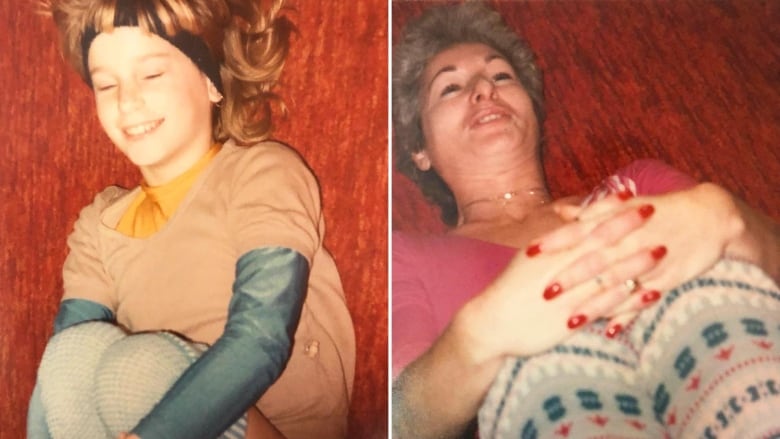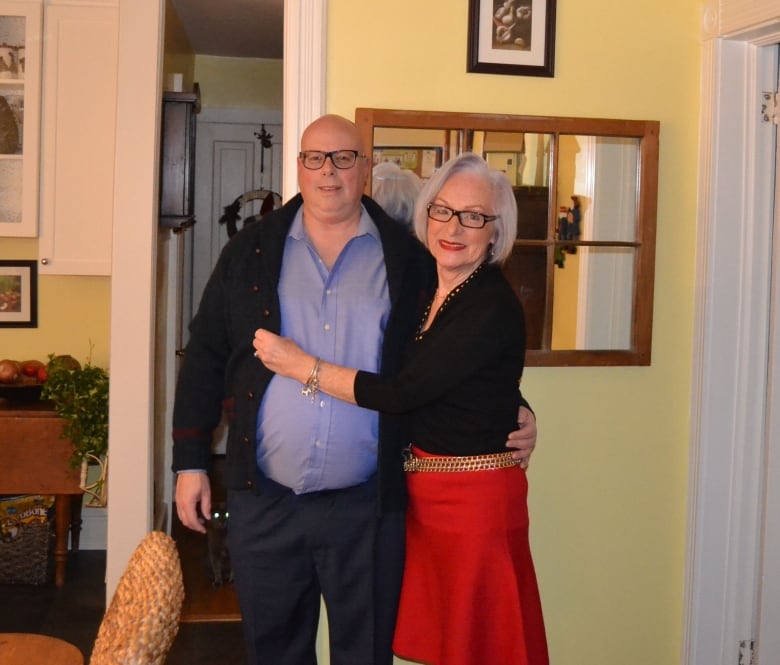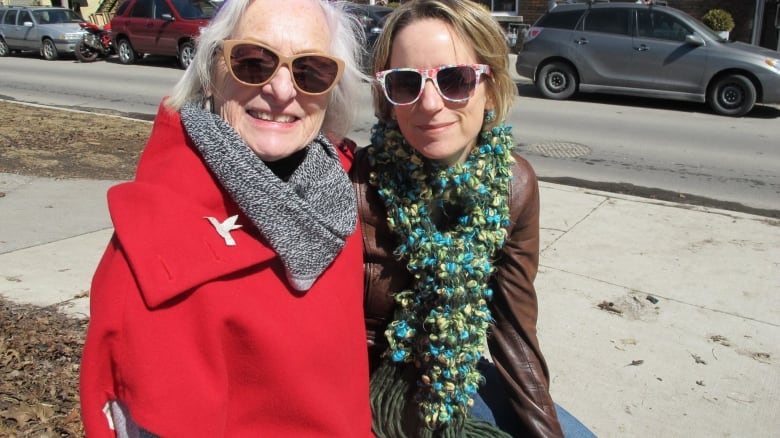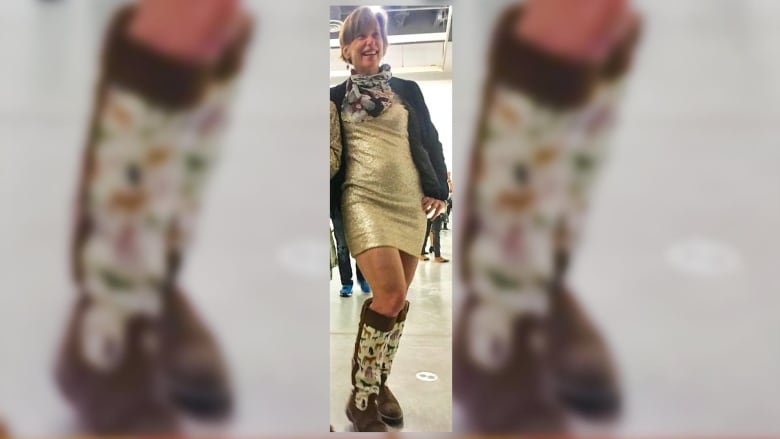This is a First Person column by Melanie Chambers, who lives in Rossland, B.C. For more information about CBC’s First Person stories, please see the FAQ.
It was just days after my mother died when I saw them on Queen Street West in Toronto — tall white canvas boots patterned with pink and blue donkeys. Mom would have loved these, I thought to myself. They were ridiculous, outrageous and inexplicable — just like her. Showstoppers. I immediately bought the boots and wore them along with a strapless white frilly dress to her backyard memorial.
But there was a time when my mother’s fashion embarrassed me. Like the time I had just finished teaching a class at Western University in London, Ont.; she came to meet me at my local bar wearing an off-the-shoulder sweatshirt with red rhinestones. In front of my friends and the bar’s regulars, I called her out.
“What the hell are you wearing?”
Her face turned ash white as she looked away.
“Mel, that was harsh,” my friend whispered.
It was harsh. It wasn’t the clothes; it was what they represented.
I was 14 when my parents divorced. After that, my mother and I blossomed at the same time. I got my first boyfriend and went to the movies; she found a younger man with a black Dodge Shelby Charger convertible.
She’d always been stylish, but post-divorce, her skirts got shorter. Colours became brighter. She was a great mom and adored me. She always tucked me in, brought me home little gifts after work and praised me up and down. But even as a teenager, I felt like her parent.

Getting ready for bed, sometimes I’d hear a honk from below our second-floor apartment window.
“Hey Linda, get that sexy ass out here.”
It was him. The neighbours shouted from their balconies, telling Mom’s boyfriend to shut up while she ran around the apartment like an excited schoolgirl.
“Help mommy find her lipstick!”
“Stephanie’s mom would never wear that,” I told her, silently judging her for not dressing more modestly like my friend’s mom as she slid on a bright red blouse that revealed the fringe of her lingerie.
Mom had her own conflicts with her parents growing up in rural Newfoundland in the late 1950s. My grandparents were hard on her. They wanted their daughters to get married, have babies and live happily ever after. Before the divorce, Mom was that woman. A good girl. Now, newly single in her early 40s, Mom was freeing herself from all that.
About a year before she died, we had a big blow-out fight. She had long ago divorced the sports car-driving man and married a wonderful man whom I adored. And who adored her.

I’d pop in to see her sometimes when I commuted to London from Toronto for work. One time, I found her out back smoking a cigarette and she asked me why I didn’t visit her as often.
Incredulous that she didn’t know, I blurted out, “Maybe I never forgave you for him.” She knew which stepfather I meant. The colour drained from her face and her bottom lip quivered.
“I did the best I could,” she shot back.
We both looked at one another in tears and silence.
Later, we resolved to have monthly chats and mend our relationship. Considering her family and life experiences, I came to understand she really did the best she could and my judgment softened.
When she was diagnosed with lung cancer in 2017, I wasn’t surprised. I was forever telling her to quit smoking — still feeling like a parent to my mom.
The program is now available in the province’s central health zone by calling 1-833-505-5864. It will be rolled out across the province over the next two years.
In her hospital bed, even with tubes in her throat, she had a purple stripe in her white hair. Cancer was no reason to let herself go.
“I need you to call Tracey, my hairdresser.”

Before Mom died, she called me onto her hospital bed. As I lay beside her, she stroked my hair and soothed me as I cried. I apologized for being so hard on her. And in those final days, our walls came down. There was nothing left but love.
Mom died a month after her diagnosis.
In the subsequent days and months, my aunt and I spoke often. She explained how my mom was fascinated by the Civil War romance movie Gone with the Wind.
“She always wanted to be Melanie, the proper lady,” Aunt Donna said. “Scarlett was too wild for your mother.” She revealed I was named after that same Melanie — the kind-hearted friend of the protagonist.
I didn’t know.
It explained so much of her need to experiment, to live loudly, and perhaps why she wanted something different for me.
When my stepfather asked what I wanted of hers after the memorial, I replied without hesitation: her clothes.
After Mom’s memorial, I wore the donkey boots often. “Are those donkeys?” surprised strangers would ask while others admired them. I love these compliments.

These moments with strangers often lead to a chat and a chance for me to share stories of her eccentric style — a furry black purse in the shape of a Scottish terrier; Mickey Mouse Birkenstocks; earrings in the shape of recycling boxes.
A week after her memorial, I went to a techno music party in a warehouse in Toronto. I went to Mom’s closet and picked out a white summer dress with spaghetti straps and another frilly crinoline. I accessorized with her many trinket bracelets.
All night I gave away her stuff to the other partygoers and talked about her. It’s something she’d likely have done. And I finally understood and am embracing living loudly thanks to her.
Do you have a compelling personal story that can bring understanding or help others? We want to hear from you. Here’s more info on how to pitch to us.




